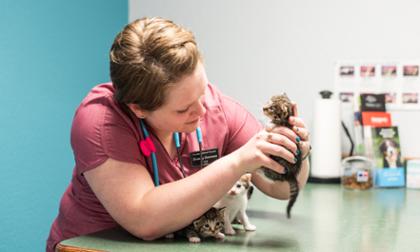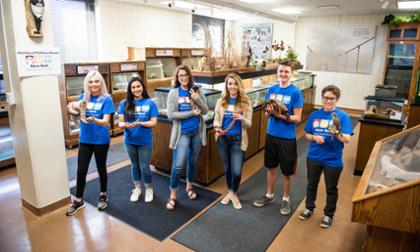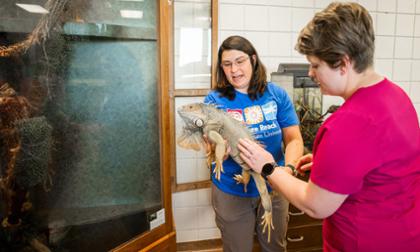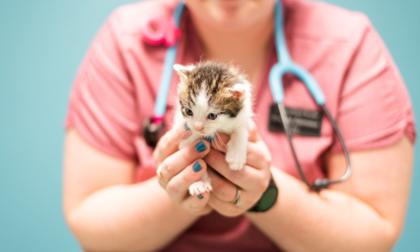That’s where Pittsburg State University has the advantage, say recent graduates of the pre-med program who have gone on to become veterinarians — including the newest veterinarian in Pittsburg.
“Pitt State has a great reputation for preparing students for vet schools,” said Dr. Brandy Lawrence (BS ‘17), who just joined Broadway Animal Hospital, minutes from campus, after earning her doctorate in veterinary medicine from Oklahoma State University in May.

Lawrence would like to see more young people enter the field — there has been a significant uptick in pet ownership as a result of the pandemic, she said, and many long-time veterinarians in the region are retiring.
"It's hard for clinics to keep up with demand," she said.
According to the Bureau of Labor Statistics, employment of veterinarians is projected to grow 17 percent from 2020 to 2030.
Lawrence got her start in caring for animals at Nature Reach, a wildlife education program that is part of the university’s Biology Department.
“Pre-vet students can work there as an animal caretaker — it’s what I did, and it gave me terrific experience while in school,” she said.
The Nature Reach program, located both in Heckert-Wells Hall on campus and at the university’s Natural History Reserve off campus, is directed by Delia Lister (BSEd ‘04), who also got her start caring for animals as a student employed by Nature Reach.
Now, Lister provides unique training to her Nature Reach student employees. They also earn a paycheck.

Hallee Belgum, who graduated in May, said the experience was valuable.
“I learned hands-on training techniques for raptors, or birds of prey, as well as how to care for so many unique creatures — ferrets, iguanas, bearded dragons, hissing cockroaches, different species of frogs, toads, turtles, tortoises, tarantulas, and Vietnamese walking sticks!” she said. “This experience was an animal lovers’ dream. I learned so many new techniques and caretaking strategies for species I had never had experience with.”
Broadway Animal Hospital, owned by Dr. Heather Wallace, offers veterinary services to Nature Reach — so Lawrence has come full circle.

Broadway Animal Hospital also offers a class called Internship on Pre-Veterinary Medicine in partnership with the Biology Department.
“I highly appreciate the willingness of Dr. Heather Wallace and her staff to contribute to our program and to provide the highest recommendations for our students,” said Associate Professor Anuradha Ghosh, who is the lead advisor in PSU’s pre-vet program. “It's very important that students have experience working with a vet. Veterinarian schools like to see a good letter of reference from a practicing vet.”
Cheyla Myrick, who just graduated in May, and current student Kayli Wolf are among those to have completed the internship recently; they said it allowed them to apply in a clinical setting what they were learning in the classroom.
Mikaleigh Woodward, who just graduated from veterinary school at Kansas State University, said a summer internship spent doing research while she was at PSU was an advantage when getting into vet school.
“I accepted a well-paid internship with Hills Pet Food in Topeka, which focuses on doing research on developing pet food products for kidney health,” she said. “I am thankful for having the opportunity to work in Ghosh’s research lab — I feel like it gave me a real advantage in the interview process.”
A class called Pre-Health Orientation, taught by Professors Phil Harries and Mandy Peak-Bryan, brings to campus experts in the field of health sciences — including local veterinarians like Dr. Micky and Dr. Mary Sue Painter from Town & Country Animal Hospital — and admissions representatives from veterinarian schools to share information with students.
Harries and Peak-Bryan also invite back to campus PSU graduates who are working on their doctorate degrees in veterinary medicine at Oklahoma State, K-State, and the University of Missouri to motivate students and share their experiences.
Often, connections made in these classes open the door for internship and job shadowing opportunities.
Ghosh coordinates the online “Pre-Vet Community” for peer mentoring and sharing updates on veterinary news from across the country, and Professor Dan Zurek organizes meetings of the Pre-Vet Club for socializing and service. “These are both open platforms for exchanging ideas and sharing knowledge,” Ghosh said.
Professors Virginia Rider, James Dawson, and Peter Chung have played a pivotal role in recruiting pre-vet students, Ghosh said.
And Associate Professors James Whitney, Andrew George, and Christine Brodsky advise the PSU Wildlife and Fisheries Society, which actively participates in unique field trip opportunities such as helping sea turtles on Dauphin Island, Alabama.

Pre-vet students also have numerous volunteer opportunities at area animal shelters, including the Southeast Kansas Humane Society, and privately-owned agencies, including Horses of Hope.
“Whenever I visit with pre-vet advisees, I am always touched by their love for animals. Their compassionate nature helps them to stay on track and become a veterinarian or an associate veterinarian or a vet tech in their career path,” Ghosh said.
Biology majors with a pre-vet emphasis follow the same course pathway as pre-med/dental students, but there are specific attributes added to their curriculum and resumé that make them stand out while they apply to veterinarian schools.
Based on each student’s interest in admission to a particular veterinary school, their advisors tailor courses in biology, chemistry, and physics and help them choose electives to gain knowledge about animal behavior, caretaking, anatomy and physiology, and other focus areas.
“Our department strives to offer the best for our future veterinarians,” Ghosh said. “We welcome all interested pre-vets to Pitt State to follow their dreams.”
According to the American Veterinary Medical Association, the mean starting salary is $106,053 for new graduates going into corporate practice and $93,894 for those going into independent private practice.
Listen:
Gorilla Connection Podcast: Caring for Animals
Learn more: